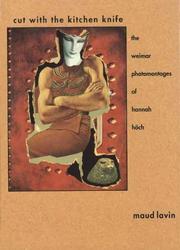| Listing 1 - 2 of 2 |
Sort by
|
Book
ISBN: 3893225714 Year: 1993 Publisher: Stuttgart : Cantz,
Abstract | Keywords | Export | Availability | Bookmark
 Loading...
Loading...Choose an application
- Reference Manager
- EndNote
- RefWorks (Direct export to RefWorks)
Photography --- photography [process] --- photomontages --- Contemporary [style of art] --- hedendaagse kunst --- fotomontage --- biografieën (genre) --- fotografie --- anno 1900-1999 --- Germany --- Photography, Artistic --- Photographers --- Exhibitions. --- Biography. --- photomontages [visual works]

ISBN: 0300047665 Year: 1993 Publisher: New Haven (Conn.) Yale university
Abstract | Keywords | Export | Availability | Bookmark
 Loading...
Loading...Choose an application
- Reference Manager
- EndNote
- RefWorks (Direct export to RefWorks)
The women of Weimar Germany had an uneasy alliance with modernity: while they experienced cultural liberation after World War I, these "New Women" still faced restrictions in their earning power, political participation, and reproductive freedom. Images of women in newspapers, films, magazines, and fine art of the 1920s reflected their ambiguous social role, for the women who were pictured working in factories, wearing androgynous fashions, or enjoying urban nightlife seemed to be at once empowered and ornamental, both consumers and products of the new culture. In this book Maud Lavin investigates the multi-layered social construction of femininity in the mass culture of Weimar Germany, focusing on the intriguing photomontages of the avant-garde artist Hannah Höch. Höch, a member of the Berlin Dada group, was recognized as one of the most innovative practitioners of photomontage. In such works as Dada-Ernst and Cut with the Kitchen Knife, she reconstructed the wonderfully seductive mass media images of the New Woman with their appeal intact but with their contours fractured in order to expose the contradictions of the new female stereotypes. Her photomontages exhibit a disturbing tension between pleasure and anger, confidence and anxiety. In Weimar—as today—says Lavin, the representation of women in the mass media took on a political meaning when it challenged the distribution of power in society. Höch's work provides important evidence of the necessity for women to shape the production and reception of the images that redefine their role.
Photomontage --- Women --- 7.071 HOECH --- 77.05 --- 77.071 HOECH --- collages --- dadaïsme --- Duitsland --- fotografie --- fotomontage --- Höch Hannah --- kunst --- twintigste eeuw --- Composite photography --- Photography, Composite --- Montage --- Photography, Abstract --- Photography, Handworked --- History --- Höch, Hannah, --- Art --- photomontages --- Dada --- Höch, Hannah --- anno 1900-1999 --- Germany --- photomontages [visual works]
| Listing 1 - 2 of 2 |
Sort by
|

 Search
Search Feedback
Feedback About
About Help
Help News
News